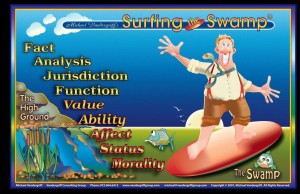By Deryn Sumner
Ahh, sanctions. One of my favorite topics, and something I thought could be useful to explore over the next several months of newsletter articles. (As a side note, I received a suggestion that this series be titled, “Everything But the Kitchen Sanc-tion.” And yes, I can hear you groaning from here). Complainants can request sanctions for the agency’s actions during the investigative stage, such as failing to conduct an investigation, failing to timely complete an investigation during the regulatory timeframe, failing to conduct an appropriate investigation, or failing to require employees to cooperate during the investigation. Complainants can also request sanctions if the agency failed to properly preserve relevant documents, such as notes taken by a selection panel during interviews, or if the agency engages in other misconduct during discovery, such as destroying documents or improperly coaching witnesses. And don’t worry agencies, you can move for sanctions too, including if the complainant fails to cooperate in litigation or respond to the administrative judge’s orders.
By regulation at 29 CFR 1614.109(f)(3), sanctions can range from drawing an adverse inference against the non-moving party, excluding evidence that would be helpful to the non-moving party from the record, making determinations of fact in favor if the moving party, issuing a decision fully or partially in favor of the moving party, or the fun catch-all of “other actions as appropriate.” These sanctions can include awarding attorneys’ fees to a complainant, or dismissing a complainant’s hearing request and remanding the complaint to the agency for issuance of a Final Agency Decision. And no agencies, no matter how many times you fruitlessly argue that the Commission cannot order a federal agency to pay attorney’s fees as monetary sanctions because of the Anti-Deficiency Act, the Commission has roundly rejected this argument. As the Commission stated in Complainant v. Dep’t of Army, EEOC No. 0720130011 (August 7, 2015):
The Commission previously has addressed, and rejected, the Agency’s arguments regarding sovereign immunity and the Anti–Deficiency Act. In Mirabal v. Department of the Army, EEOC Appeal No. 0720120007 (November 9, 2012), request to reconsider denied, EEOC Request No. 0520130236 (March 27, 2014), we found that the AJ properly ordered the Agency to pay attorney’s fees incurred because of delays in the hearing on the complainant’s claim of national-origin discrimination in violation of Title VII of the Civil Rights Act of 1964, 42 U.S.C. § 2000e et seq. Citing Matheny v. DoJ, EEOC No. 05A30373 (2005) and other Commission precedent, we concluded that the Commission has authority to issue monetary sanctions and that the AJ’s actions were consistent with Commission regulations, EEO MD-110, and Commission precedent. See also Complainant v. Dep’t of the Army, EEOC Appeal No. 0720130033 (Apr. 24, 2014)(rejecting Agency’s arguments, in a Title VII case, that it did not have authority to pay attorney’s fees sanction because of sovereign immunity and a potential violation of the Anti–Deficiency Act), req. for reconsideration denied, EEOC Request No. 0520140359 (Mar. 20, 2015).
Something I’m going to stress throughout this series is the idea that if the party you represent has engaged in sanctionable conduct, you may want to recommend to your client that you argue that although sanctions may be appropriate, a lesser sanction than the one proposed would serve to address the misconduct. Sanctions should, after all, be narrowly tailored to appropriately address the conduct at hand. See Abulsaad v. Dep’t of the Navy, EEOC App. No. 0120102379 (March 26, 2012).
Next month, we’ll discuss how to respond to motions for sanctions where the agency has not timely completed the Report of Investigation (spoiler alert: blaming it on the contractor your agency uses to conduct EEO investigations isn’t going to fly). Sumner@FELTG.com

 I trained Charlie Manson’s psychiatrist.
I trained Charlie Manson’s psychiatrist. [To contact Michael, email
[To contact Michael, email